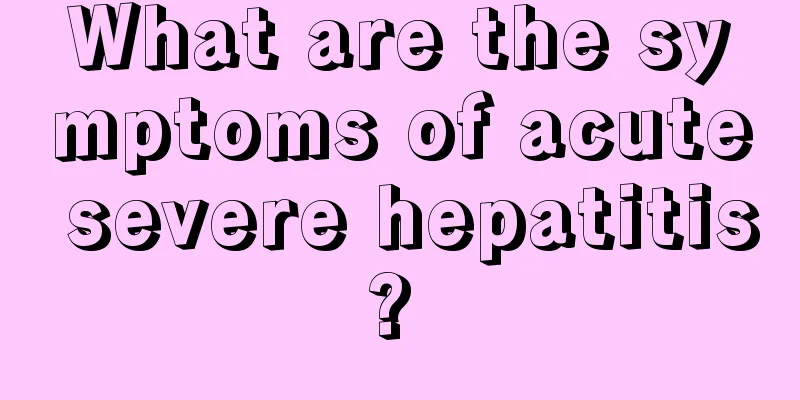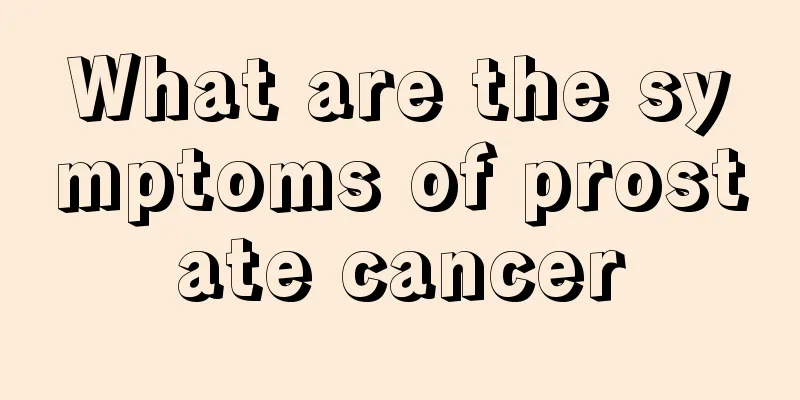What are the symptoms of acute severe hepatitis?

|
Many people have acute severe hepatitis. This disease usually develops rapidly and recovery is not fast, so everyone should be vigilant. Generally, many people with acute severe hepatitis may first enter the early stage of jaundice, and then enter the jaundice stage, and then go through a recovery period, which will completely lead to an attack of hepatitis, so everyone must be vigilant. (1) Pre-jaundice: The disease usually starts slowly, with mild fever or no fever, and joint pain and rash are common. Common symptoms include fatigue, loss of appetite, aversion to greasy foods, nausea, vomiting, and sometimes abdominal pain and diarrhea. This phase lasts an average of 5-7 days. (2) Jaundice stage: The fever subsides, the subjective symptoms are slightly alleviated, and jaundice appears on the sclera and skin, reaching a peak within a few days to 3 weeks. Dark yellow urine may cause transient lighter stools. Pain in the liver area, enlarged liver, soft texture, tenderness and percussion pain. This phase lasts 2-6 days. (3) Recovery period: The patient's jaundice gradually decreases and disappears, the stool color returns to normal, the skin itching disappears, the appetite improves, the physical strength recovers, the gastrointestinal symptoms are alleviated, the jaundice disappears, and the liver function returns to normal. This period is generally 1-2 months. 2. Acute anicteric hepatitis This type is more common and has milder symptoms, including general fatigue, loss of appetite, nausea, and abdominal distension. Physical signs include enlarged liver, soft texture, tenderness and percussion pain. This type of hepatitis has mild symptoms and is often overlooked. The course of the disease is about 2-3 months. Sometimes the severity of symptoms or signs varies depending on the severity of the disease. Acute severe hepatitis, also known as fulminant hepatitis. The clinical features are acute onset, with impaired consciousness, bleeding, jaundice and liver shrinkage within 10 days. The duration of illness does not exceed 3 weeks. The early clinical manifestations of fulminant hepatitis are similar to those of acute icteric hepatitis, but the disease progresses rapidly. Therefore, if the following symptoms appear, a severe diagnosis should be considered. Obvious symptoms of systemic poisoning. As the jaundice progresses, the patient will become extremely weak, listless, drowsy or insomniac, have personality changes, mental abnormalities, impaired calculation and orientation, asterixis, and impaired consciousness. |
<<: What should I do if my armpits often sweat?
>>: What should I do if hemorrhoids occur?
Recommend
Skin cancer usually forms scabs in the early stages
Skin cancer usually has scabs in the early stages...
Three places of itching in the early stage of breast cancer
There may be many reasons for itching in the thre...
How to wash blood stains off cotton cloth
In daily life, many people accidentally get blood...
What are the symptoms of Behcet's syndrome?
Behcet's syndrome is a less common disease in...
Will liver cancer cause shoulder pain? Generally not
Liver cancer is one of the most common malignant ...
The functions and effects of the heart
The heart is the most important organ in the huma...
What are the normal values of bile acid? What is the significance?
The gallbladder is an important auxiliary digesti...
What are the reactions to acupuncture and moxibustion to treat diseases
When acupuncture is used to treat diseases, it is...
Question: How to prevent bladder cancer?
The secret to preventing bladder cancer is very s...
What should I do if my shoes rub my feet?
Every summer, it is time for many girls to show o...
Are Indian breast cancer drugs really that good?
Female breasts are composed of skin, fibrous tiss...
What tests are needed for skin cancer
What tests are needed for skin cancer? Skin cance...
What soap should I use to wash my face and remove acne
Young people always have acne on their faces. The...
Does the diagnosis of lung nodules necessarily mean lung cancer? To prevent lung cancer, you need to do these 3 things
Lung nodules are an imaging diagnosis, which refe...
What is the reason for eye mucus?
Studies have shown that many children have freque...









